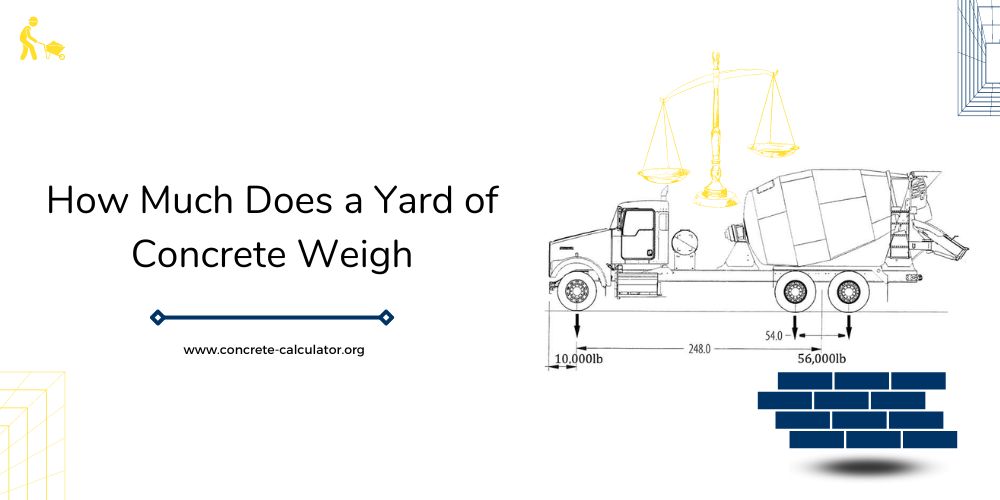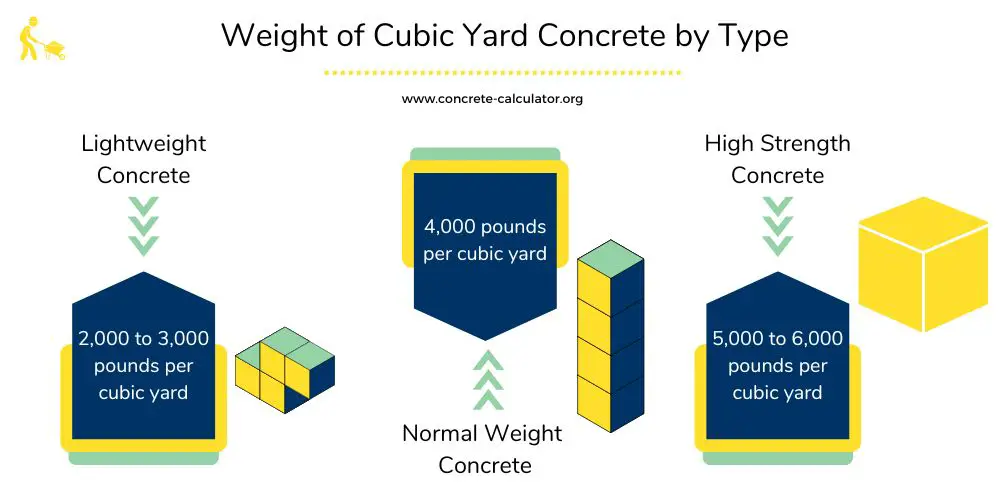How much does a yard of concrete weigh? In general, a cubic yard of dry concrete weighs around 4,000 pounds. This is based on the density of concrete, which is 150 pounds per cubic foot.
The actual weight of a given yard of concrete may vary due to several factors, including the mix design, the amount of water and additives used, and the size of the aggregate.
For example, if a larger amount of aggregate is used in the mix design, it will require more water to achieve a workable consistency. This will result in a heavier weight and greater volume of concrete.

For anyone planning a home improvement or landscaping project, understanding the weight of concrete products is essential for making sure you can safely transport and work with the material. If your project calls for ordering a yard of concrete from a professional supplier, it’s important to know how much that weighs in order to ensure that both you and the delivery truck driver are prepared.
Wet Concrete Weight Vs Dry Concrete Weight
The weight of concrete when it is freshly mixed can be up to 20% more than the dry weight. This increase in weight is due to the added water content which makes the concrete easier to work with and shape.
As the concrete dries, some of its internal water evaporates, and its overall weight decreases. When calculating a yard of wet concrete, you should use the higher weight to account for this difference.
Wet concrete weighs 4,000 to 4,050 pounds per cubic yard. Dry concrete weighs around 3,400 to 3,600 pounds per cubic yard. In some cases, the weight of concrete can be even higher due to large aggregate sizes or a higher water-cement ratio.
Always use a concrete calculator to eliminate the concern of determining the weight of your concrete!
Factors That Affect Concrete Weight
The weight of concrete can also be affected by the type of aggregate used. Different types of aggregate, such as sand and gravel, can affect the overall weight of concrete. Larger aggregates will generally result in a heavier mix, making it more difficult to work with and shape.
Concrete can also vary in weight depending on the amount of water added. A lesser amount of water will result in a dryer mix that is more brittle but less workable. Conversely, adding too much water will result in a mix that is over-saturated and difficult to shape.
Finally, the type of cement used can also affect the weight of the concrete. Different types of cement have different densities and weights, which can impact the overall weight of a cubic yard of concrete.
Compressive Strength of Concrete
It is important to note that the weight of a cubic yard of concrete does not determine its strength. The compressive strength of concrete is determined by the ratio of cement to water used in the mix. The higher this ratio, the stronger and more durable the concrete will be.
As such, the weight of a cubic yard of concrete does not necessarily indicate its strength or longevity. The strength of a concrete slab can also be affected by other factors, such as curing time and the way it is handled and laid on the ground.
See Also: How To Dispose of Concrete?
Weight of Cubic Yard Concrete by Type
The weight of a cubic yard of concrete can vary depending on the type of concrete used. Here are approximate weights for some common types:
– Lightweight Concrete: 2,000 to 3,000 pounds per cubic yard
– Normal Weight Concrete: 4,000 pounds per cubic yard
– High Strength Concrete: 5,000 to 6,000 pounds per cubic yard

Importance of Concrete Weight In Professional Projects
As a civil engineer, one of the most important factors to consider when planning and executing a large-scale construction project is the weight of the concrete that will be used, this weight can have a significant impact on the overall design and construction of a project.
On my recent project, a large commercial building, we needed to pour a total of 3,000 cubic yards of concrete for the foundation and other structural elements. This meant that we had to carefully plan and coordinate the delivery and placement of the concrete to ensure that we could pour it safely and efficiently.
We also had to take into consideration the weight of the concrete when designing the foundation and other structural elements. We needed to ensure that the foundation would be able to support the weight of the building and the concrete. To achieve this, we performed detailed calculations and simulations to ensure that the foundation would be stable and secure.
In addition to the weight of the concrete, we also had to consider other factors such as the environmental conditions and the soil conditions. By taking all these factors into account, we were able to pour the concrete safely and efficiently, and the building was completed on time and within budget.
In conclusion, understanding the weight of concrete is a crucial factor in planning and executing large-scale construction projects. It’s important to take into account the weight of the concrete and other factors such as environmental conditions and soil conditions to ensure that the project is completed safely, efficiently, and on time.
Also Check: How Long Does Concrete Take To Dry?
FAQs
How much does a 10-yard truck of concrete weigh?
A 10-yard truck of concrete typically weighs between 18,000 and 20,000 pounds. This weight can still vary depending on the type and amount of aggregates and water used in the mix.
How many tons is a yard of concrete?
A yard of concrete weighs approximately 2 to 2.5 tons and sometimes more depending on the mix and type of aggregate used.
How much does 1 meter of concrete weigh?
A cubic meter of concrete typically weighs around 2,400 to 2,800 kilograms because a cubic meter is equivalent to 1,000 liters and a liter of concrete typically weighs around 2.4 to 2.8 kilograms.
Concluding Weight of Cubic Yard Concrete
As you can see, the weight of concrete can be very variable and it really depends on the ingredients that are used as well as how much water is added. The good news is that there are now ways to calculate the weight of your yard before you even pour it, so you can make sure that you have enough material.
If you have any questions about concrete or need help calculating the amount you need for your project, please let me know in the comments below and I will be happy to help.
I am John Doe, a licensed civil engineer and concrete expert. I received my degree in Civil Engineering from Washington State University and have been working in the field for 15 years. Based in Seattle, WA, I specialize in concrete projects and calculations. I have a passion for sharing my knowledge and experience through my website concrete-calculator.org
